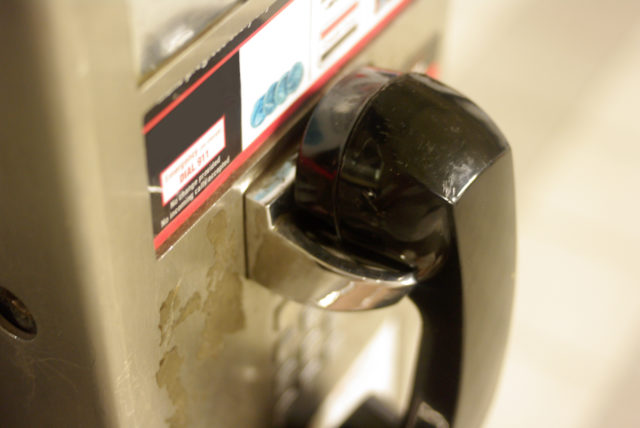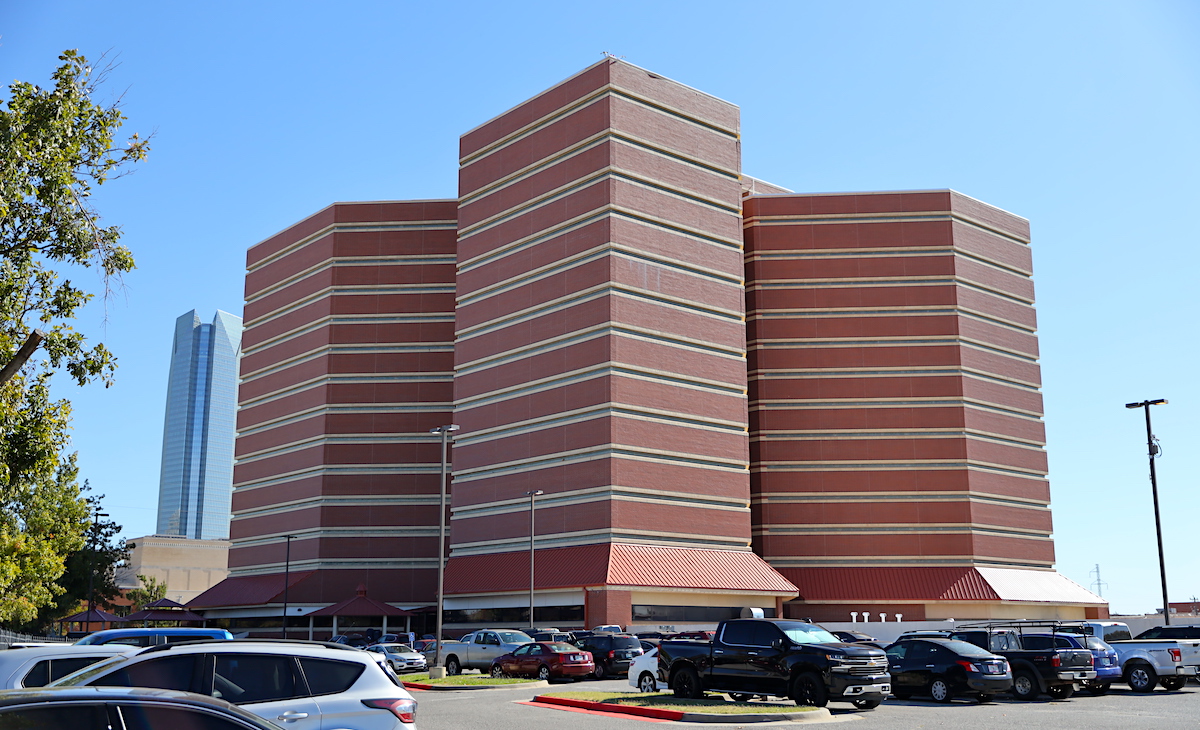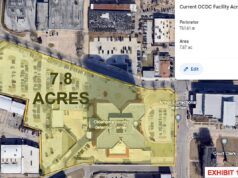

Detainees at the Oklahoma County Jail are provided meals, clothing and some other necessities, but their ability to stay in contact with the outside world comes at a price.
Currently, the jail’s more than 1,500 detainees get one free 15-minute phone call per week and one 30-minute video call, but after that they pay $0.16 per minute for phone calls to family members, friends and even attorneys, according to assistant jail administrator William Monday. At the September meeting of the Oklahoma County Criminal Justice Authority — which governs the jail and is known as the jail trust — Monday told trustees that the rate had recently been reduced from $0.25 per minute.
The subject of phone call charges was raised at that meeting by Jess Eddy, a criminal justice activist who has advocated for better conditions at the beleaguered facility.
“I don’t mean to beat a dead horse, but I looked at the revenue that the trust collected from telephone services, and it’s about $110,000,” Eddy said in September. “My understanding is that it’s probably half or a third that. The company is making a profit as well, so the money that we’re making off people through the telephone services is sizable, and I just want to repeat that I think that’s immoral. (…) Other detention centers around the country have found ways to provide safe and secure telephonic access to inmates at no cost to their families and to them. I think these are the poorest of the poor, and to make such a large profit margin off of them is immoral.”
The cost of the calls adds up. The jail trust saw $120,000 in revenue from the calls in August, the most recent figures available. In July, it logged more than $110,000. The numbers are similar throughout the rest of the year, ranging from $117,000 to $125,000 each month.
Trust member Chad Alexander said the issue is something the governing body should examine.
“I think Mr. Eddy made a very eloquent argument about the morality of the issue,” he said. “People having the money versus people who don’t have the money. It’s not just a profit scheme. I think people who don’t have the finances to put on their card, and not being able to communicate with their families, I think we should look for alternatives.”
Advocates for change say the phone charges pose, essentially, an ethical issue, and they also point to concerns about privacy and allowing detainees full access to legal counsel.
Other jurisdictions have made changes

Jurisdictions around the country have recently examined the issue of charging inmates for calls. Last year, Connecticut Gov. Ned Lamont signed a bill into law that made calls from prisons in that state free to inmates. In 2020, San Francisco made calls free to detainees at its county jail, the first county in the country to do so. Massachusetts, Illinois and Texas are other states that have attempted to reduce the cost of calls or make them entirely free for those in jails and prisons, but they have seen mixed results. Milwaukee County voted to make calls from its jails free earlier this year, but leaders later reversed that policy after its projected cost became a budget problem.
The FCC has attempted to tamp down costs to detainees for in-state calls, which make up about 80 percent of calls from detainees, but a federal appeals court ruled that the FCC lacked jurisdiction to do so.
The average cost of calls for detainees in American jails and prisons is $5.74 for a 15-minute call, but in some places the cost can rise to nearly $25 for the same amount of time, according to the nonprofit Prison Policy Initiative. At the current $0.16-per-minute rate in the Oklahoma County Jail, a 15-minute call would cost about $2.40. At the prior $0.25 rate, the call cost detainees $3.75.
ACLU of Oklahoma attorney Hanna Roberts said she believes there is a clear moral imperative to change the system.
“No, it is not ethical or moral for jails to take advantage of individuals incarcerated during what is perhaps the worst time in their lives,” Roberts said. “Many incarcerated folks have no means of communicating with loved ones, friends or their attorneys outside of paying for phone calls at an exorbitant price. Those charged with a crime also have a Sixth Amendment right to counsel, and absent the ability to talk with their attorney about their case, that right is being violated.”
Roberts also raised privacy concerns about the calls.
“The practice of many jails, including Oklahoma County, is to record all phone calls made by inmates and provide those recordings to the prosecution,” she said. “This makes consulting with one’s attorney by phone about the facts of the case impossible and places undue hardship on the attorney-client relationship in many respects.”
Most of those inside America’s county jails were living at or below the federal poverty line before being incarcerated, according to the Brookings Institute. A study by that organization found of those who worked before being incarcerated in jails or prisons earned just $12,780 per year.
“Those individuals who cannot post bail and are forced to remain in jail pending trial are most affected by telephone charges, because they are often awaiting jury trial for months, sometimes even years at a time,” Roberts said. “One of the only ways to communicate with the outside world is by telephone, but phone calls cost people incarcerated and their families unreasonable amounts of money that could otherwise go to the person’s legal defense or their bail so that they might be able to fight their case from the outside.”
Advocate: Phones sometimes unreliable
Sara Bana, a criminal justice activist, has been advocating for the dissolution of the jail trust and for Oklahoma City and other municipalities to stop housing people in the county jail. Bana said even when detainees in Oklahoma County pay for phone services, it can be a mixed bag, so detainees lack a reliable way to connect people outside the jail.
“For nearly four years, I’ve been talking about the phones,” Bana said. “The phones are out of date. It’s almost unbearable to try and communicate. Half of the time they don’t work. Many of the folks there don’t have access to the phones in a proper, timely manner. I think it’s inappropriate. I think it’s absolutely exploitative.”
Like Roberts, Bana also expressed privacy concerns.
“The idea that the district attorney can sit and listen to the phone calls of a detainee who is not yet convicted, that’s a violation of their privacy,” she said. “So I think if we could make the phone calls free that would be beautiful, but I would take it a step further and say unless they are convicted you shouldn’t be able to tap into their phone calls. They are also consumers, and they are paying for a service.”
Roberts said the best option is to make the calls free, or allow for more free calls per detainee each week. She said the current situation does not work and should not continue.
“One solution is to make phone calls between people incarcerated and attorneys free of charge and to no longer record these conversations,” she said. “This would allow defendants to consult with their attorney about their case without having to worry about the District Attorney listening to the privileged conversation. An additional solution is to allow people incarcerated so many calls per day, free of charge. People incarcerated should not be a source of revenue for the county, and using them as such places the burden of jail operation on the backs of the poor — an untenable situation, especially in Oklahoma County.”




















